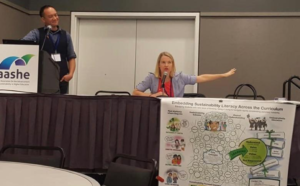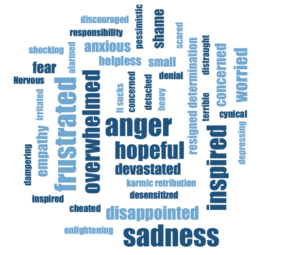Our session, “Worry & Hope: Results from a Focus Group Study on Students and Sustainability Curriculum,” at the 2018 AASHE Conference & Expo in Pittsburgh began with some quotes from students, which were read out loud by the participants. The main point of the session was that conducting this study has placed student voices directly, honestly, and literally in our ears (as we transcribe the many hours of semi-structured group interviews) and thus at the center of the work we are doing at the University of Hawaii System Office of Sustainability.
“We shouldn’t be sitting here just kind of watching it happen. Because it’s talked about, but not to a point where people are afraid of it like they should be. It’s kind of just like, “Oh yeah. That’s happening. But you know, what can you do?”
“I’ve lived many places around the world and I’ve seen places that have done such amazing things with their troubles…. I’ve also seen places that just gave zero craps and their water was polluted, their life was polluted and everything was horrible.”
“Most of us are more concerned about passing our classes and getting a good grade rather than actually participating, because we feel “that can be done after I graduate.”
And then they get a job, and they think “I can do that after I finish my job.”
Then they finish the job and they think, oh, I’m too tired. It’s just a self defeating cycle.”
Whether or not faculty are designing curriculum to include climate change, the sociocultural field in which students experience their college courses IS influencing what they learn. Our study is an inquiry into what students know, think, feel and do about climate change and global sustainability issues. How do they experience this content in their classes? What sources of information inform their understanding? Which classes include or mention sustainability? How well do students understand the basic science and local impacts of climate change? And most importantly, how do they feel about all of this, and how does climate change influence their choice of major, career and visions for their future?
 At AASHE, we shared our experience as a research team, and how useful it is for a Sustainability Coordinator (Matt Lynch) to partner with a Professor (Krista Hiser). In addition to our reflections, we shared some preliminary data including this “code cloud,” pictured below, that represents 177 emotion “utterances” from our data. (We have completed 14 focus groups at 8 campuses across the state, with over 160 students participating).
At AASHE, we shared our experience as a research team, and how useful it is for a Sustainability Coordinator (Matt Lynch) to partner with a Professor (Krista Hiser). In addition to our reflections, we shared some preliminary data including this “code cloud,” pictured below, that represents 177 emotion “utterances” from our data. (We have completed 14 focus groups at 8 campuses across the state, with over 160 students participating).
 Across the higher education sector, we need to have greater awareness and sensitivity to the underlying emotional landscape that students bring to campus. Emotional grief, climate anxiety, pre-traumatic stress disorder….these are real factors influencing how and what students learn. This field of emotion needs to be part of campus conversation about recruitment, retention, completion and engagement, not to mention student and faculty wellness.
Across the higher education sector, we need to have greater awareness and sensitivity to the underlying emotional landscape that students bring to campus. Emotional grief, climate anxiety, pre-traumatic stress disorder….these are real factors influencing how and what students learn. This field of emotion needs to be part of campus conversation about recruitment, retention, completion and engagement, not to mention student and faculty wellness.
We are realistic about what such a study can definitively capture. There are many messy variables and though patterns are emerging, definitive conclusions or implications may be impossible. The point of our session was that the process of engaging in this study has been immensely impactful. We feel connected to a wider range of students and perspectives. We gain credibility in conversations with administrators, facilities coordinators, funders and board members when we tell them about this study. We sense the urgency of supporting faculty in designing coherent, effective, accurate, and impactful assignments, courses, and sequences that lead to self-efficacy, understanding, and empowered action.
We are drafting a short-term white paper and developing a paper for publication next year. One implication that we can suggest right now, though, is to reinforce the importance (which you all already know) of creating what we call “cognitive resonance” by modeling and sharing sustainability solutions as frequently as possible. Many students seem to live in a fragile state, wavering between what one student called “worry and hope.” She said:
“It’s just like, some days you see the news, where it’s mostly bad, and it makes you worse. But other days you see someone making a small little change and you think, now I feel good! I can take over the world! I can do something! I feel like just having a little bit of hope CAN overpower the doubts.”
Dr. Krista Hiser is a professor of Composition & Rhetoric and serves as the sustainability curriculum coordinator for the University of Hawaii System Office of Sustainability; Matt Lynch is the Sustainability Coordinator for the ten-campus system. Contact the authors to use their focus group interview protocol or learn more about the study. Contact them at hiser@hawaii.edu, mklynch@hawaii.edu.
—
The views, opinions and positions expressed by the authors and those providing comments on these blogs are theirs alone, and do not necessarily reflect the views, opinions or positions of the Association for the Advancement of Sustainability in Higher Education (“AASHE”).